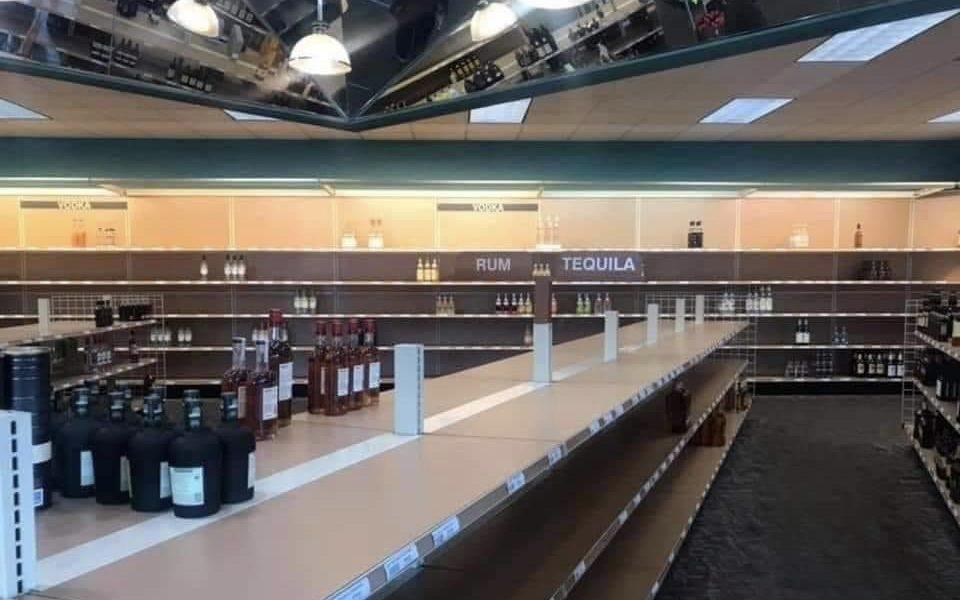Featured photo: ABC stores, like this one in Kernersville, aren’t able to keep up with demand these days, and bars are the same way. (photo by Nikki Leddy)

“Shot of Jameson.”
“No.”
“Okay, Tullamore Dew.”
“Try again, we ran out yesterday.”
The customer moves on to bourbons, only to be shot down again, like a kid trying to find a prom date the day of. No Makers, no Beam, no Dickel. We rarely have a cheap rail whisky these days. Lately it’s been some nondescript brand I’ve never heard of, the type of forgettable name that emulates the design of the more popular bottle they’re ripping off, but tastes like the cheap swill it is. It gets the job done, as they say. We reach a truce at Canadian fare: There’s a quarter bottle of Crown Royal left.; the Seagram’s ran out last night.
It’s only 5 p.m. on a Tuesday.
So, why am I having to explain to multiple customers every night that we are out of liquor? The head of the Triad ABC Commission, Gregory Bradsher, likens it to a snow day.
“Each component has its own issues,” he says. “There’s hoarding, there are supply-chain issues, glass shortages, label shortages, cork shortages, production shortages left over from the past year.”
He goes on to mention that sales are up from last year, even surpassing 2019. It boils down to “demand being so much greater and the supply so little,” he says.
Traxler Littlejohn, Winston-Salem native and owner of Nippitaty Distillery in Charleston, SC, elaborates on the glass shortage.
“I have switched my bottle style three times and I’m still struggling to buy bottles,” he explains. “My current glass supplier, which is one of the largest in the country, has stated that I need to buy enough bottles for half a year. It really sucks because you have to come up with 10 to 12 grand to pay up front.”
Things are worse in NC.
Ours is one of 17 “control states,” where the sale of various alcohols is managed by a state commission board. That commission oversees the county boards and controls wholesale distribution. The local boards have a monopoly on liquor and are responsible for the sale, distribution and law enforcement of each. They do so through a private inventory contractor combined with state-owned retail outlets.
If it sounds confusing, it’s because it is. The 171 independent local boards across the state adjust for their customer base and act independent of each other, but all are sheltered under the ABC umbrella, who use a third-party distribution company to acquire, store and deliver liquor throughout the state. The distribution company, LB&B Associates, based in Maryland, is contracted by the state to maintain storage warehouses, delivery, and ordering capacities.
Part of the reason for this set-up is that state regulated alcohol is profitable. In 2020, the ABC’s revenue was $1.3 billion. The revenue is distributed throughout the city and county governments with the state ABC acting as a buffer between the distillers and retail. This allows them to monopolize the alcohol distribution in the state and regulate it. The ABC contracts with LB&B to act as the intermediary. LB&B receives liquor from the distillers, stores it in their warehouse (for a fee per case, called a “bailment”), and distribute it.
Nowadays, a bar places an order, say about $3,000 worth of liquor. On Friday, the bar manager shows up with a check at the local ABC distribution site, sometimes waits hours, and is finally blessed with about $900 of liquor that includes brands they didn’t order and an apologetic, “That’s all we have for you this week.”
Think of it like an alcoholic bread line. This week, whiskey. Last week was tequila. Those of you not in the bar industry but who frequent the ABC stores for home use have likely seen empty shelves as well. This is a common occurrence across the state, while just over the border in places like South Carolina, the liquor shelves are more plentiful, despite the various product shortages. South Carolina follows a different method of distribution where the sellers are responsible for their liquor stock as opposed to the state being the go-between. So, what gives?
The state’s ABC spokesman, Jeff Strickland, touted sales numbers when asked about the shortage, “a 13.7 percent increase over July 2020, and total sales in July 2020 were 21.99 percent higher than the year before…. I expect many did not forecast or expect this level of explosive growth,” he says. That being said, Strickland says the current contract obligations with LB&B are not being met. Continuous delays, shortages and long waits have a common denominator: the company responsible for moving the product. Private retail in states where there isn’t an intermediary were allowed to stock product that was predicted to be short as demand increased, and the effects are apparent.
The ABC and LB&B were targeted by the state auditor in 2017, and the results were less than favorable. Excessive costs, underpayments to distillers, empty warehouses and the lack of the ABC’s monitoring of LB&B were all documented. The audit’s key findings were that “the commission did not procure, administer, and monitor the LB&B contract… in accordance with state policies and best practices.” This process allowed distillers to be underpaid by LB&B, have $11 million in costs exceeding the contract limits, and approval of more than $5 million in price increases with little to no oversight by the commission.
The ABC deflected the report by saying that the local boards are responsible for monitoring the performance of LB&B, not them. The audit stated that the independent local boards do not have the means to monitor the contracts with the state.
Appointed ABC commissioner Michael Herring resigned shortly afterwards while criticizing the audit for being “fictitious.” The ABC board unanimously recommended that LB&B’s contract should be renewed in March 2021. The new contract began July 1. Per a press release, the new contract requires “nearly error free and on time deliveries as well as increased delivery frequency to the 171 local ABC boards.”
So far, most retailers are not seeing that.
There are multiple dynamics at work, truly. Political appointees, a highly profitable industry, high demand combined with production shortages across the board and an overseeing body that sees fit to renew multi-million-dollar contracts with third-party entities with a track record of botching contractual obligations.
So where does that leave us? Millions in the coffers of the state and LB&B, while shortages and delays abound. No Grey Goose, but the bottle sure does look similar. No Malibu, but here’s some coconut off brand that you’ll throw some pineapple juice in so no one will be the wiser. Maybe the next time I’m hard up for a drink I’ll go out of state to purchase Jameson — at a Walgreens.
Join the First Amendment Society, a membership that goes directly to funding TCB‘s newsroom.
We believe that reporting can save the world.
The TCB First Amendment Society recognizes the vital role of a free, unfettered press with a bundling of local experiences designed to build community, and unique engagements with our newsroom that will help you understand, and shape, local journalism’s critical role in uplifting the people in our cities.
All revenue goes directly into the newsroom as reporters’ salaries and freelance commissions.


Leave a Reply